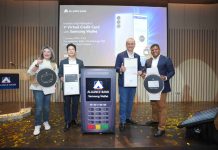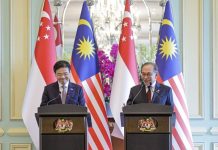- Malaysia to adopt a more focused and targeted approach in attracting quality investments
- Impact of Rising Oil Prices on Malaysia’s Revenue Will Only Be Known After One Year
- Government Mulling e-wallet Salary Payment for Maids
- LikeCoin Issues First 30,000 Tokens for Content Creators
- Crowdfunding Platform and Professional CFOs Join Hands to Support SMEs
- Singtel Innov8 and NUS to create Singapore’s first regional cyber security start-up hub
- Singapore Design Week 2018 celebrates the impact of design
- Ippin meets global demand for Japanese Sake with launch of vast online collection

Approved Investment Projects in Malaysia Up 5.8 per cent in 2017
Malaysia recorded 5,466 investments projects amounting to RM197.1 billion in 2017, an increase of 5.8 per cent compared to 2016. However, overall approved investments dropped by 7.4 per cent compared to RM212.9 billion in 2016 amid a decline in investments in the services sector. The figures were released by the Malaysian Investment Development Authority (MIDA) in conjunction with the release of the Malaysia Investment Performance Report 2017. MIDA said Foreign Direct Investments (FDI) approved amounted to RM54.7 billion, a decline of 7.5 per cent compared to the previous year, while domestic direct investments (DDI) declined 7.5 per cent to RM142.4 billion. Malaysia’s FDI inflows in 2017, dropped by 17 per cent to RM39.183 billion. The trend reflected the global FDI flows which fell 16 per cent last year, reaching an estimated US$1.52 trillion due to weaker economic growth and major global policy risks.
MIDA said approved investments in the manufacturing sector in 2017 in Malaysia, increased by 8.9 per cent year-on-year to RM63.7 billion, against investments of RM58.5 billion previously. The sector drew 687 projects and created 56,421 job opportunities in 2017. The bulk of investments came from petroleum products, electrical and electronics products and natural gas. Approved FDI in the manufacturing sector for 2017 stood at RM21.6 billion with China, Switzerland, Singapore, the Netherlands and Germany, being the main sources. Approved investments in the services sector for the year, amounted to RM121 billion, a decline of 17.2 per cent compared to 2016, due to a drop of 29 per cent in real estate sub-sector. However, the number of projects in the sector increased to 4,731 from 4,392 in 2016, reflecting a shift in investment strategy to smaller-sized projects.
The Malaysia Investment Performance Report 2017 stated that the Malaysian economy is expected to continue to grow in 2017 despite the challenging external environment. “As an open economy, Malaysia is not immune to external uncertainties, but its economic and financial reforms and policies have somewhat but weathered the challenging external impact. The Report added that the country’s fundamentals remain strong with a stable labour market, manageable inflation, healthy foreign reserves and sound financial systems to support a sustained momentum in economic growth. The Report stated that Malaysia would continue to adopt a more focused and targeted approach in attracting quality investments in high technology, capital-intensive and knowledge-intensive industries; high value added industries; R&D activities as well as in new growth areas, in line with the Government’s e orts to become a high-income nation by 2020. In this regard, MIDA’s focus will be leveraging on megatrends development and smart manufacturing to target products with technological advancements and new product applications as well as focusing on high value R&D activities and the Internet of Things (IoT). This emphasis is to nurture and encourage both foreign and local investors and manufacturers to switch their mindsets on the Malaysian manufacturing landscape and move up the value chain with quality investments that incorporated hi-tech innovations.
Impact of Rising Oil Prices on Malaysia’s Revenue Will Only Be Known After One Year
Second Finance Minister, Datuk Seri Johari Abdul Ghani said the impact of rising global oil prices on Malaysia’s revenue will only be known after one year. He explained that the ups and downs of oil prices would not provide accurate expectations on additional revenue as the oil price announced during the presentation of Budget 2018 was an estimated annual average price. “During the Budget 2018 presentation, the government estimated 2018’s petroleum revenue to average RM37.8 billion, including petroleum income tax, royalties and ancillary income from Petronas. “The estimate was based on average oil price of US$52 per barrel. For the period of 1 January to 23 February, 2018, global average oil price was US$67.15 per barrel,” he said at the Dewan Rakyat this morning.
Government Mulling e-wallet Salary Payment for Maids
The salary of foreign maids is to be paid by way of the e-wallet in the future, directly into their bank accounts, instead of the conventional or cash methods. Deputy Prime Minister and Home Minister, Datuk Seri Dr Ahmad Zahid Hamidi said the matter had been discussed in-depth by the Home Ministry and the Ministry of Human Resources with the foreign missions concerned. “I believe we have to migrate from the conventional methods as we progress to a developed nation. We should never allow anything bad to befall the (migrant) workers,” he told the Dewan Rakyat.
LikeCoin Issues First 30,000 Tokens for Content Creators
LikeCoin has announced the genesis of more than 30,000 new tokens over the Chinese New Year period to create a new digital currency for content creators. This followed a successful Red Packet program that resulted in more than 2,000 people in Hong Kong, Taiwan and Southeast Asian countries receiving freshly-minted LikeCoin tokens as part of their festive celebrations. The campaign helps LikeCoin in its mission to create a new digital currency for freelance photographers, artists and designers, and grow an innovative blockchain-based ecosystem that rewards content creators globally.
Crowdfunding Platform and Professional CFOs Join Hands to Support SMEs
Channelling $300,000 to a SME in need of funds this year marked the first effort in Funding Societies and the CFO Centre’s partnership to address two major problems that small and medium enterprises commonly face – cash flow constraints and financial management. The CFO Centre offers on-demand financial consultancy services to SMEs by seasoned Chief Financial Officers (CFO), while Funding Societies addresses their capital constraints through crowdfunding of business loans. The collaboration will work towards improving accounting, working capital management and thereby growth prospects for small businesses who lack such resources. According to a joint study by SPRING and PwC Singapore, cash flow management has consistently surfaced as a notable challenge for SMEs. Yet effective working capital and cash flow management are crucial to the survival and growth of any business. Without running or sustainable cash flow, a company cannot maintain operations or invest in business development. The demand for part-time CFO services amongst Singapore SMEs is also on the rise. The CFO Centre reported a revenue growth of close to 30 times from 2013 to 2016. The CFO Centre’s part-time CFOs advise SMEs on best financial management practices, from fixing cash flow issues to establishing an efficient accounting process
Singtel Innov8 and NUS to create Singapore’s first regional cyber security start-up hub
Singtel Innov8, the corporate venture capital unit of Singtel, and the National University of Singapore (NUS), through its entrepreneurial arm NUS Enterprise, today joined forces to launch Innovation Cyber Security Ecosystem at Block 71 (ICE71). This will be the country’s first integrated regional cyber security hub to spawn and support early stage and growing start-ups, entrepreneurs and academics from around the world. Supported by the Cyber Security Agency of Singapore (CSA) and the Infocommunications Media Development Authority (IMDA), ICE71 aims to strengthen Singapore’s growing cyber security ecosystem by attracting and developing competencies and new technologies. Singtel and NUS have been deepening their partnership to support Singapore’s transformation into a Smart Nation and help enable the country’s digital economy. Through the NUS-Singtel Cyber Security Research and Development Laboratory that was set up in 2016, the partners are jointly developing advanced cyber security solutions that could help mitigate the rapid rise in cyber security risks.
Singapore Design Week 2018 celebrates the impact of design
The fifth edition of the Singapore Design Week (SDW) promises to be a platform that showcases Singapore’s thought leadership in design, connects design talents and businesses, and lets Singaporeans and visitors experience the value of design through delightful activities. At the SDW 2018 opening ceremony, Dr Yaacob Ibrahim, Minister for Communications & Information Dr. Yaacob Ibrahim announced a new industry transformation roadmap for the design sector. Design Singapore Council (Dsg) is working closely with nine design industry associations to identify three-year roadmaps for sector-wide transformation. The Singapore Furniture Industries Council (SFIC) is the first to complete this roadmap. SFIC has identified strategies that will take advantage of Asia’s growing demand for urban living solutions. It will help businesses to design user-centric urban living solutions and to become more agile through continuous testing and prototyping. Dr Yaacob also announced that 10 organisations have joined Dsg’s Innovation By Design programme, which helps companies and government agencies use design to develop business strategies and bring about organisational change.
Ippin meets global demand for Japanese Sake with launch of vast online collection
The e-commerce platform Ippin has launched one of the Internet’s largest Sake collections, bringing the Japanese rice wine to customers throughout Asia and beyond. The online shopping mall specializes in direct sales of “Japan-quality” items, delivering them direct to customers’ doors in a broad selection of countries. Now their collection of over 1350 varieties of Sake has been made available to the world, allowing them to be purchased online with the click of a button. Sake is a traditional Japanese rice wine and an intrinsic part of Japanese culture. It has grown in popularity in recent years, and demand for the fermented beverage has increased worldwide.
























